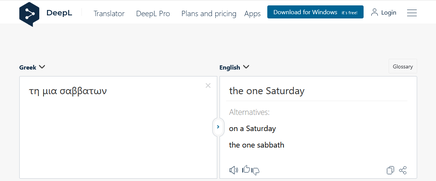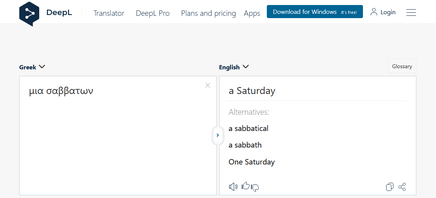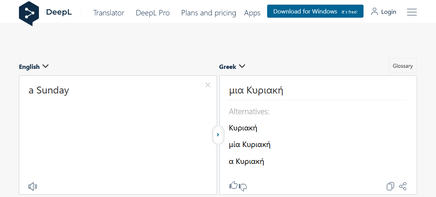- Home
- English
- Structure of the Bible
- Structure of the Menorah
- Ancient Menorahs
- Calendar and Feasts
- Resurrection on Sabbath
- Introduction
- Day
- Sabbath
- High Sabbath
- Pre-Sabbath
- Week
- Interlinear Bible
- Church Opinions
- 1. No Sunday
- 2. A Sabbath
- 3. No Friday
- 4. Intermediate Day
- 5. Three Days and Three Nights
- 6. Manipulations
- 6.1 Sabbath not Sunday
- 6.2 Plural σαββατων not week
- 6.3 one not first
- 6.5 Day of the Sabbaths
- 6.7 Lords Day
- 7. Old Bibles
- Greek Bibles
- Latin Bibles
- Gothic Bible
- English Manuscripts
- English Bible Prints 1
- English Bible Prints 2
- English Bible Prints 3
- English Bible Prints 4
- German Manuscripts
- German Bible Prints 1
- German Bible Prints 2
- Spanish Bibles
- Italian Bibles
- Swedish Bibles
- μια των σαββατων
- Mt 28-1
- Mk 16-2
- Mk 16-9
- Lk 24-1
- John 20-1
- John 20-19
- Acts 20-7
- 1Cor 16-2
- Lk 18-12
- 7 Languages
- Palm Sabbath
- Omer
- Summary
- The Rapture
- Rabbi Kaduri Note
- 666
- 888
- Video
- Info
- Francais
- Deutsch
- Espanol
- Dutch
- Ελληνική
- Pусский
- Introduction
- Day
- Sabbath
- High Sabbath
- Pre-Sabbath
- Week
- Interlinear Bible
- Church Opinions
- 1. No Sunday
- 2. A Sabbath
- 3. No Friday
- 4. Intermediate Day
- 5. Three Days and Three Nights
- 6. Manipulations
- 6.1 Sabbath not Sunday
- 6.2 Plural σαββατων not week
- 6.3 one not first
- 6.5 Day of the Sabbaths
- 6.7 Lords Day
- 7. Old Bibles
- Greek Bibles
- Latin Bibles
- Gothic Bible
- English Manuscripts
- English Bible Prints 1
- English Bible Prints 2
- English Bible Prints 3
- English Bible Prints 4
- German Manuscripts
- German Bible Prints 1
- German Bible Prints 2
- Spanish Bibles
- Italian Bibles
- Swedish Bibles
- μια των σαββατων
- Mt 28-1
- Mk 16-2
- Mk 16-9
- Lk 24-1
- John 20-1
- John 20-19
- Acts 20-7
- 1Cor 16-2
- Lk 18-12
- 7 Languages
- Palm Sabbath
- Omer
- Summary
Jn 20:19: On which day did Jesus appear to the disciples?
John 20:19: "Then the same day at evening, being the first day of the week, when the doors were shut where the disciples were assembled for fear of the Jews, came Jesus and stood in the midst, and saith unto them, Peace be unto you." - This is the text of the King James Bible (KJV), but the basic Greek text speaks of another day, namely of "a Sabbath". Below are the Greek words with pronunciation (transcription) and literal translation:
"ουσης (ouses; it being) ουν (oun; then) οψιας (opsias; evening) τη (te; the) ημερα (hemera; day) εκεινη (ekeine; same, that one) τη (te; the) μια (mia; one) σαββατων (sabbaton; sabbaths, sabbath or sabbath day/s) και (kai; and) των (ton; the) θυρων (thyron; doors)..."
There are two variants between the Alexandrian text type (e.g. Codex Sinaiticus, NA28) and the Byzantine text type (e.g. Textus Receptus, Majority Text), both of which contain exactly the same statements and even make the translation easier:
τη μια σαββατων (te mia sabbaton = on a Sabbath/s) - Alexandrian text type
τη μια των σαββατων (te mia ton sabbaton = on one of the Sabbath/s) - Byzantine text type
The translation into English is very simple:
"When it was evening on the same day, the one Sabbath..." or "the one of the Sabbaths..."
Six translation errors in one sentence
The comparison of the basic Greek text with the King James Bible (KJV) shows that in support of the alleged appearance of Jesus on a Sunday six translation errors were made in one sentence:
1. one (μια = mia) has been removed from the Bible (mia is a cardinal number)
2. first (πρωτη = prote) was added to the Bible (prote is an ordinal number)
3. sabbath/s (σαββατων = sabbaton) has been removed from the Bible
4. day (ημερα = hemera) has been added instead of the "Sabbath day/s"
5. week (εβδομαδα = ebdomada) has been added to the Bible
6. Sunday (ημερα του ηλιου or ηλίου ημερα = heliou hemera) was added in some Bibles
However, there are many Catholic and Protestant Bibles that have been translated correctly (see below).
The facts about John 20:19
The free Bible program ISA3 (Scripture4All, Link1, Link2) shows the literal translation and grammar, including the Concordant Literal Version (CLV 1926, Concordant Literal NT, CLNT; Link):

CLV (CLNT): "It being, then, the evening of that day, one of the sabbaths, and the doors having been locked where the disciples were gathered together, because of fear of the Jews, Jesus came and stood in the midst and is saying to them, "Peace to you!" (Link).
John made no mistakes in chapter 20, he described in verses 1 and 19 the resurrection of Jesus and the gathering of the disciples "on a sabbath" and no other day.
To avoid repetition, please refer to the explanations given in Mt 28:1; Mk 16:2; Lk 24:1, Jn 20:1 and μια των σαββατων.
The Colored Scriptures show John 20:1 in several languages:

The Google and DeepL Translation Confirms the Sabbath (Saturday)
The online translation program from Google, which everyone knows, has no problems whatsoever translating Greek words into English. It doesn't mention the Sabbath, but it does mention the Saturday and not the Sunday or "the first day of the week". The Greek words cannot mean two different days at the same time. This is not the case in any language in the world:
It should be noted that the sign behind the English translation of "μια των σαββατων" means "Translation verified by Translate Community." Yes, it is so, the Greek text means "one of the Sabbaths" and nothing else.
In the Alexandrian text type the word "των" (the) is missing, making it even easier to translate "τη μια σαββατων" (on a/one Sabbath/s). The plural was often used in the ancient Greek language to describe a Sabbath day in the singular, as other Bible passages in the NT and in the Septuagint prove.
If God had meant the "first day of the week" (πρωτη ημερα της εβδομαδας), he would have had to use the words in the Greek language that Google shows on the left-hand site. Instead, God defined the Day of Resurrection exactly 7 times in the NT with the name "Sabbath" in the singular and plural, so that there should be no quarrel in Christianity.
The free online translation programme DeepL also comes to the same conclusion, the Byzantine text type (Textus Receptus, Majority Text) and the Alexandrian text type (Codes Sinaiticus, NA28) never differ in their statements:
Martin Luther translated John 20:19 accurately
The word mia (one; cardinal number) must never be translated as prote (first; ordinal number). It would always be wrong. The Bible is the Word of God and He knows why he uses some words and not others.
Martin Luther translated 1522-1545 very well. He writes not only that the women came to the tomb "on a Sabbath very early", but also that Jesus appeared to the disciples "on the evening of the same Sabbath". Every German child understands this:
Mk 16:2: „an einem Sabbather seer früe“ = „on a sabbath very early“
Jn 20:19: „Am abend desselbigen Sabbaths“ = „on the evening of that same Sabbath“
For more than 400 years, until its revision around 1900, the famous Luther Bible proclaimed the resurrection of Jesus and His appearing before women "on a Sabbath morning" and His appearing before His disciples "on a Sabbath evening." There are countless facsimiles of old bibles with the original text by Luther (see German Bible Prints-2 and Facsimiles).
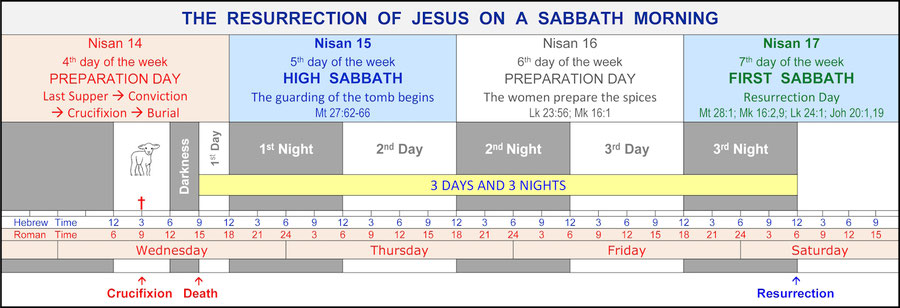
The 7,000 year plan of God with mankind and the World Sabbath
Many old and new Bibles around the world have been correctly translated and know nothing about Easter Sunday. Jesus rose from the dead on the 7th day of the week and thus fulfilled his plan for the salvation of mankind in a perfect way. This also symbolizes the Rapture and resurrection of the saints at the beginning of the Millennial Kingdom, the seventh millennium of human history. It symbolizes the resurrection, Jesus' return and the Sabbath rest for mankind and all of nature after the 6,000 years of human rule.
We believe Jesus and the many correctly translated Bibles and do not believe the theologians who teach something else. Jesus rose from the dead on a Sabbath, the day of rest, on His and His fathers day and not on the day of the Sun God and the holiday (Sunday) of those who killed Jesus.

MANY BIBLES REVEAL THE RESURRECTION SABBATH
It is amazing how many Bibles there are that have been correctly translated worldwide. How is it possible that so few Christians today know that Jesus appeared to the disciples "on a Sabbath" or "on a Saturday" evening? The answer is simple: many pastors cannot bear this message, so they recommend that their churches read revised Bible translations that erase the Resurrection Sabbath and replace it with the desired Sunday. This prevents unpleasant questions, because the basic Greek text and many other Bibles teach the Sabbath resurrection of Jesus. The abbreviations of the quoted Bible translations are defined in the directory. The original copies of most Bibles can be downloaded as facsimiles from the Internet free of charge (see Historical Bibles).

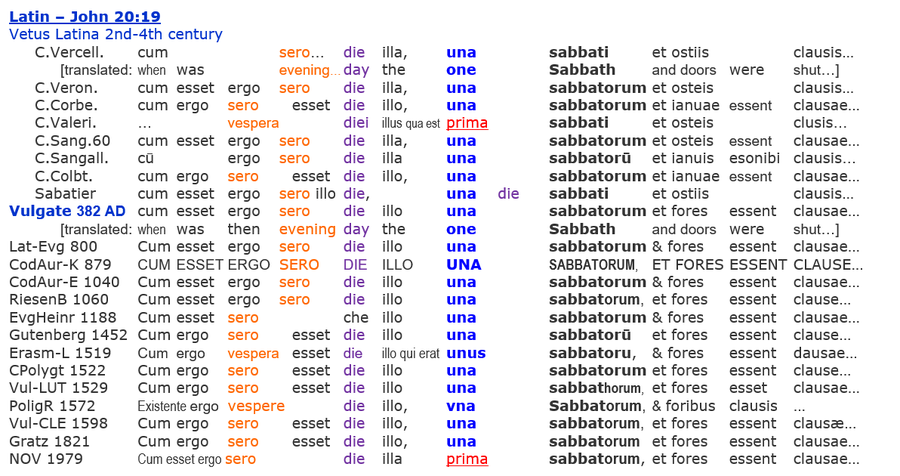
German Bibles are accurate and teach the Appearance of Jesus on a Sabbath/Saturday
For several centuries, Germany was the land of Bibles. Bible printing was invented in Germany, but even before that there were many good and exact Bible translations that told of the Lord's appearance to the disciples „on a Sabbath evening“ or „on a Saturday evening“. The Germans were particularly accurate, and since the German language (unlike English) also knows the genitive, which was often used in ancient Greek, they were able to translate the content of the NT perfectly.
Question: Why do we find in so many Catholic Bibles over the centuries the appearance of Jesus in the house before the disciples on the evening of „a Sabbath“ or „a Saturday“ and not on the evening of „an Easter Sunday“? The answer is very simple, because both the basic Greek text and the official Latin translation, the Vulgate, have always only reported „a Sabbath“, which Catholics have also translated as „a Saturday“. Since every German knows that Saturday is not Sunday, theologians came up with the crazy doctrine that the Bible supposedly means the so-called "Christian Saturday" and that this is Sunday. Thus, although the resurrection and appearance of Jesus Christ „on a Sabbath/Saturday“ was recorded in writing in Catholic Bibles, Easter Sunday was taught orally in church services instead.
The German Bibles speak either of the evening of „a Sabbath“ (singular) or „on one of the Sabbaths“ (plural) or „on a Saturday“ (singular)
or „on one of the Saturdays“ (plural) or „on the first
Sabbath/Saturday“ (singular) or on the first of the Sabbaths/Saturdays“ (plural). Although the latter
translation is not literal, it is nevertheless completely correct in content, as it is actually the „first of the [seven] Sabbaths“, which have had to be counted every year between Passover and Pentecost for thousands of years and can be found in every biblical/Jewish calendar. The vers in Mark 16:9 clearly confirms this
special „first Sabbath“. But if Christians only know the Pope's catholic gregorian
calendar and know the 4 Advent Sundays in winter, but not the seven biblical weekly
Sabbaths in spring (between Passover and Pentecost), then they cannot possibly understand what John and the other evangelists have said. An arrogant attitude automatically closes
the door to understanding the Word of God.
German Bibles often speak of „the evening of the same Sabbath" (desselben Sabbats), as Martin Luther also translated, but NOT of „the evening of the same Sunday“. Once again, it is about „the same Sabbath“, but not
about „the same Sunday“. Which German child in the world does not understand this? Only some pastors have a problem
understanding what every child understands, because they absolutely want to abolish the Sabbath or Saturday from the Bible and replace it with Sunday. Therefore, for them, „the same Sabbath" or „the same
Saturday“ is now always „the same Sunday“. So God has no chance to speak about His own day
(Sabbath), because they would rather have the Pope's day (Sunday) and therefore they twist God's Word
without mercy, regardless of whether they translate from Greek, Latin, German or Spanish, it is alwasy Sunday.
In the Middle Ages, there was no standardized spelling and many regional dialects existed, which explains the many names for Saturday: Samstag,
samztag, samtztag, sampstag, sampztag, sunabinde, sunnabent, Sambstag...
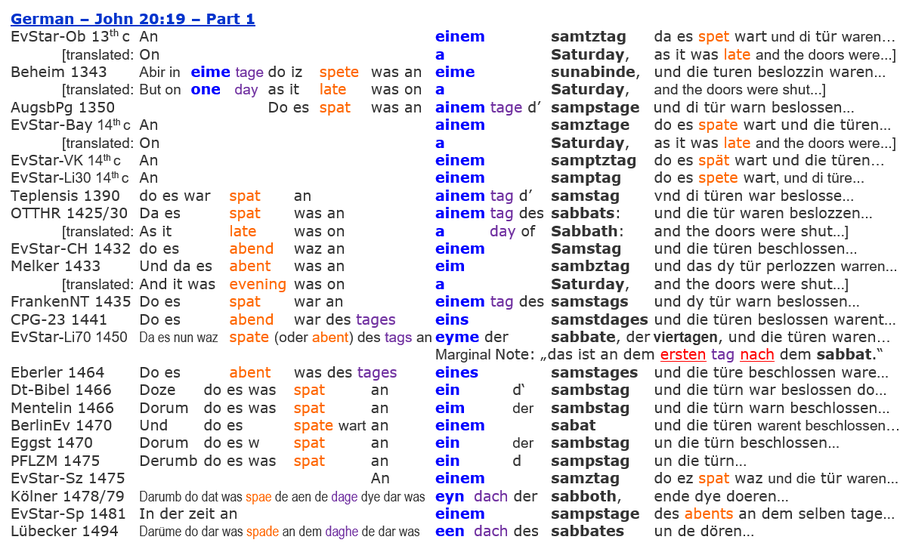
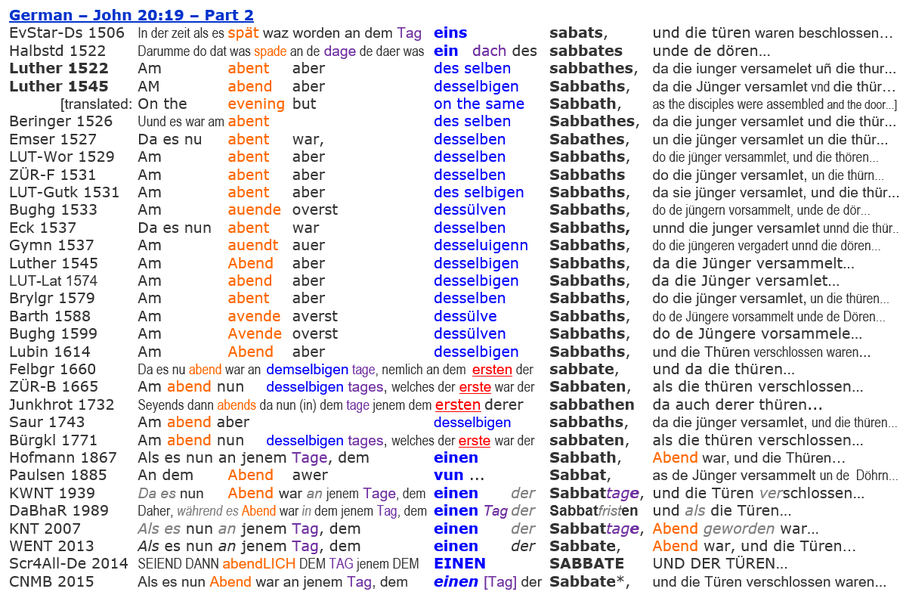
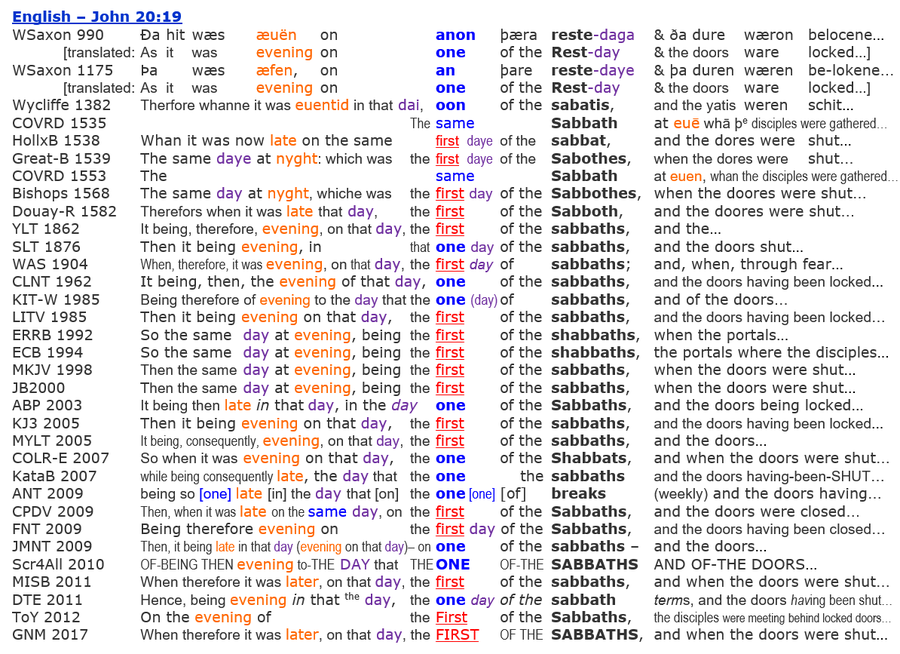
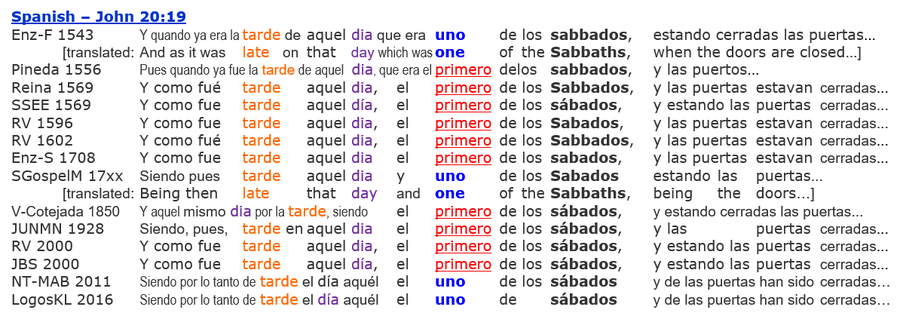
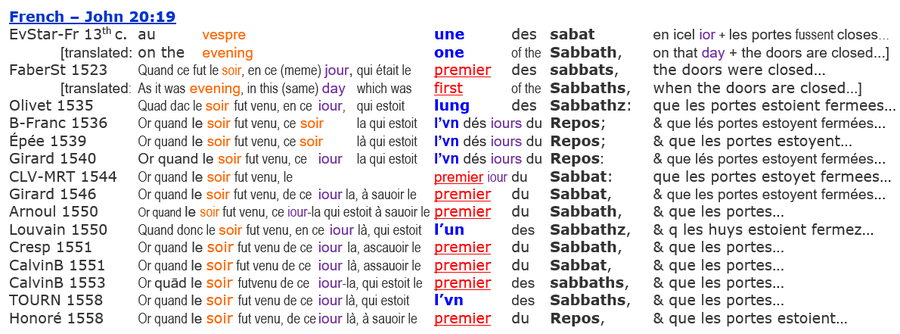







There are some Bibles that speak in general terms of "one day of the week", by which any day can be meant. But this is not correct, because God has clearly named the resurrection day. He called this day "Sabbath" seven times in the singular and plural. John 20:1 describes that Jesus appeared to the women on the morning of a Sabbath, and John 20:19 makes it clear that the Lord appeared to the disciples on the evening of the same Sabbath, when they were gathered in the house. The corresponding Greek word for "week" was known to all people, but God did not want it to appear in the New Testament, so its mention in a Bible translation is always wrong.

Incorrect translations that erase the Sabbath in John 20:19
As can be clearly seen, a chaos of translations has developed over the centuries. It is absolutely impossible that the one basic Greek text offers two different resurrection days of Jesus, from which every Christian can choose one that he would like to have. This diversity of the most diverse and contradictory translations makes it clear that we can speak of a deliberate falsification of the Word of God. The closer we get to the coming of Jesus Christ and the Rapture, the more Bibles dare to erase the Sabbath from the Bible and replace it with the unbiblical word "Sunday". So far no human being has succeeded for 2,000 years in finding the corresponding Greek words for "after", "week", "man's day" or "Sunday" in the basic text of John 20,19. Many international Bibles speak of the appearance of Jesus before the disciples on a Sabbath or Saturday evening. Nevertheless there are also bad examples which are shown here:
And the reality is even worse, because some Bible programs even translate old correct German, Spanish, Italian, Swedish or Czech Bibles incorrectly (see old Bibles), because they now always turn „on a/first Sabbath/Saturday“ or „on the one/first of the Sabbaths/Saturdays“ into „on the first day of the week“ or „on a Sunday“. In concrete terms, this means that not only the statements of the ancient languages Greek and Latin are being falsified, but also those of the modern languages, where Bibles that have already been correctly translated into national languages are being falsified again. Apparently, you cannot speak of a Sabbath or Saturday in any language in the world because it supposedly always means „on the first day of the week“ or „on a Sunday“. This shows how demonic the whole thinking of some people is. They cannot be convinced by arguments, but want to see Sunday in the Bible with all their might and by force. They come up with the craziest arguments just to seduce the Bride of Christ and take her away from God's biblical calendar with its feast days to ancient pagan feast days that are not mentioned once in the entire Bible.
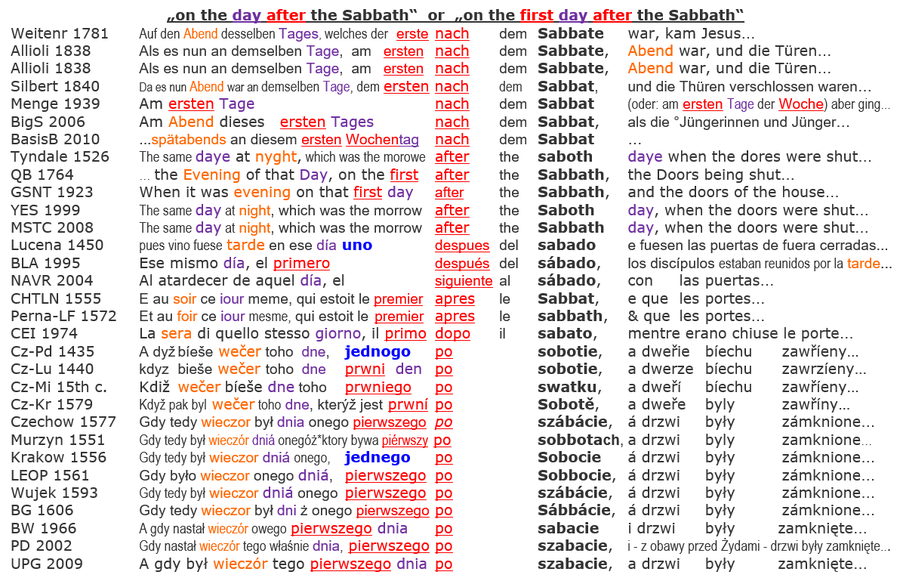
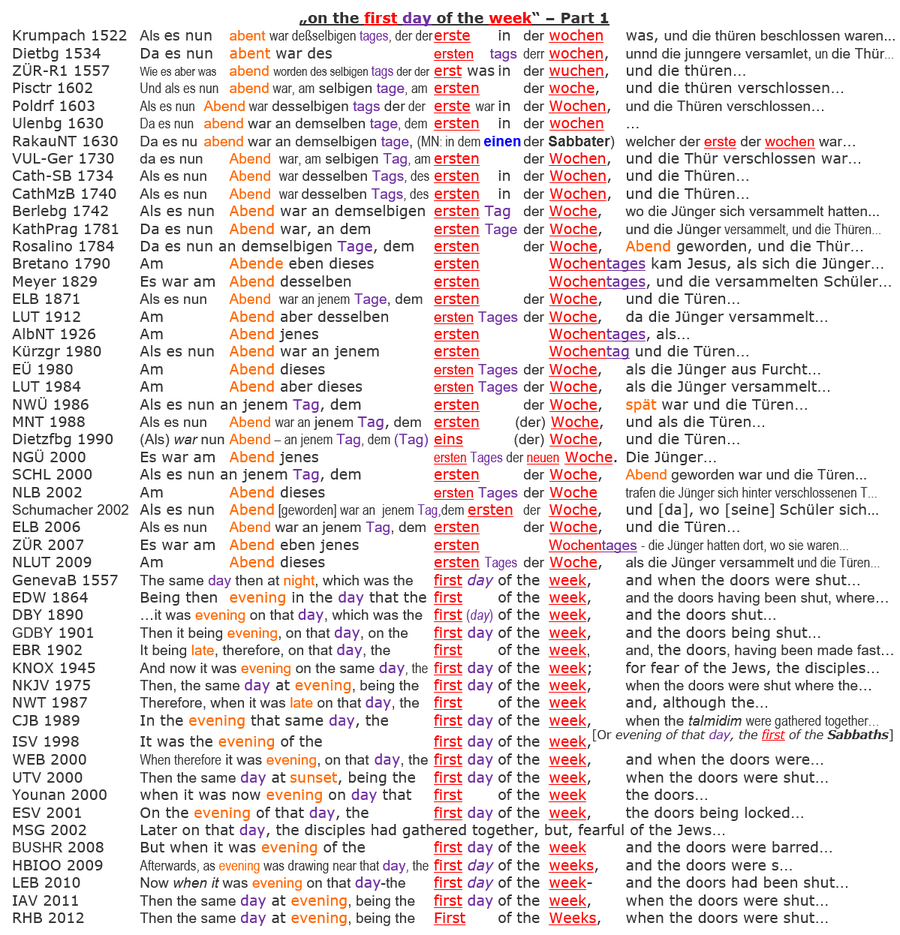
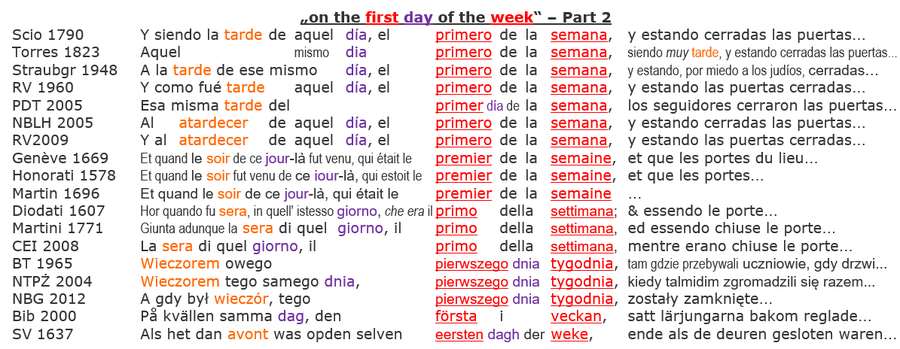
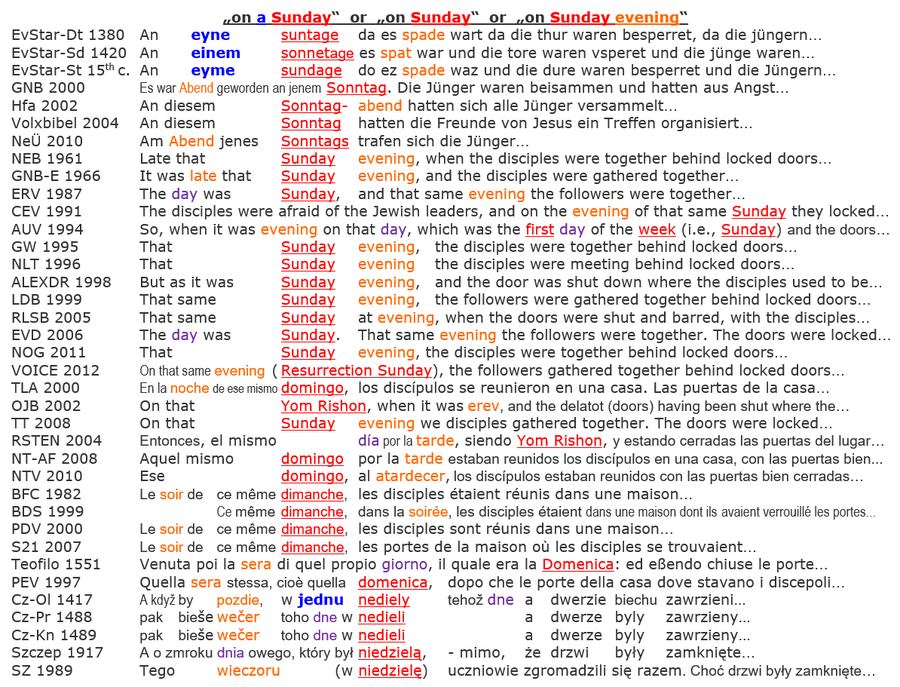
For the list of abbreviations of the Bibles see link. The original copies of most Bibles can
be downloaded as facsimiles from the Internet free of charge
(see Historical Bibles).
„Prove all things; hold fast that which is good. Abstain from all appearance of evil“
(1Thess 5:21-22)
„Take no part in the unfruitful works of darkness, but instead expose them“
(Epheser 5:11)







